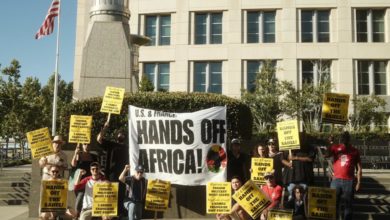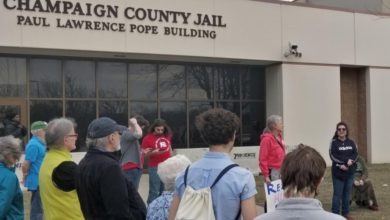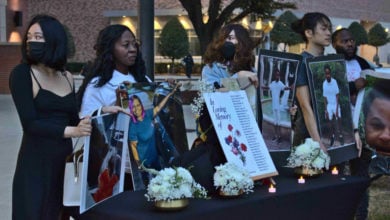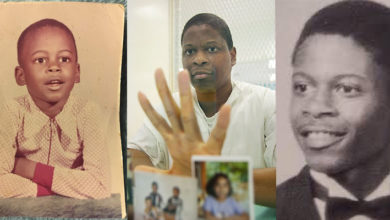On September 7, organizations from throughout the Sacramento region gathered in front of the Robert Matsui Federal Courthouse to stand in solidarity with the 10 demands of the ongoing National Prison Strike that began on August 21st in prisons, jails and detention centers around the country.
Of particular interest for those in the Sacramento region were the local participants in the strike: 179 immigrant detainees in the Yuba County Jail, north of Sacramento as well as Heriberto “Sharky” Garcia in California State Prison Sacramento, New Folsom. At the time of the press conference, Sharky had already been denied visitation despite a phone zap the previous Wednesday to pressure the authorities at New Folsom into giving some information on his well being. He released a cell phone video of himself refusing food early on during the strike as well as a compilation of revolutionary writings, poetry and art that has been made into a zine for local distribution.
A key demand raised in the Sept. 7 Press Conference, in addition to the 10 strike demands, is for an end to retaliation by prison authorities against those who speak out about inhumane conditions and human rights violations.
Some excerpts from the press conference:
Alex Jimenez of Norcal Resist & MEChA de Sacramento State:
A lot of the folks who are incarcerated, a huge majority of them are Black and Brown and as you all know, Black and brown have been targeted since 1492 since the colonization of America. Even our queer and trans communities who have been targeted in detention centers have also been impacted as well….
Immigrants in this country are being criminalized, animalized as less than human and being incarcerated in these detention centers in which they do not provide adequate medical assistance, food supplies or showers….
We are here today standing in solidarity with our communities, Black and Brown, Queer and Trans. This needs to end because they should not be treated as less than human.
John Rieger, State Chair of the Peace and Freedom Party:
Peace and Freedom Party has been supporting prison reform for decades and it still is a desperate need in this society. We’re spending way too much money on prisons and not enough money on rehabilitation and for that matter the social programs that would keep people from getting in prison in the first place.
We need to end the death penalty, life without parole, and solitary confinement…. Peace and Freedom Party is here to support the demands of the prisoners and support the prison strike.
Musa Atta, formerly incarcerated community member:
I’m here representing my brothers I left back there. I just completed 41 years inside so basically I know what they’re going through right now
When they finish up, theyre gonna have a lot of bus rides. Because that’s the next punishment for you when you do something like this here. You’ll be put on a bus ride and your property, you’re going to see two years from now. Those are the get-backs they use anytime you draw attention to the inconsistency of prison treatment.
…Only 12-14 percent of prisoners have access to the 18-22 cent jobs inside. Most of the people in there are idling or going to school…. This is another form of prisoners getting exploited and not getting anything in return. That’s why I think right now the brothers are trying to draw attention to these factors right here and to let the outside community know that the community as a whole needs to come together and get more involved with what’s happening inside prisons.
Fiorella Lema of The Decolonization Project:
The conditions in prison, reenforced by greedy corporations who would sooner see the death of Black, Indigenous, and people of color than lose another dollar, are meant to chip away at the morale of our incarcerated sisters and brothers. It is intended to numb and dehumanize the spirit of a person until they are even too tired to speak or fight back.
However, fighting back they are and our incarcerated brothers and sisters are speaking out. Through letters, visits, and phone calls, and with the mobilizing help of advocacy groups and grassroots organizations, we have been able to communicate a list of demands across the nations and assist prisoners mobilize with other prisoners across the nation.
Ebony Harper, local Sacramento activist:
What do we do when our incarcerated fam is under attack? Stand up, fight back! They are incarcerating us based on protect and serve and tough on crime. But really it’s a financial system. Really it’s about money. They need bodies in jail in order to make money…. They need your slave labor in order for this society to function.
We are all under attack. When you attack one of us you attack all of us. So it’s very important that we stand in solidarity with our incarcerated fam. It could be any one of us in jail…. It is my duty to fight for all of my siblings freedoms.
Al Rojas of the Labor Council for Latin American Advancement:
This is not America without having to say this is Indigenous territory. We are not your immigrants. When you say we’re your immigrants for us, Indigenous people, you’re saying, you aren’t from this continent…. It’s the capitalist system that’s got us where we are at today. Its economics…. If you don’t have a job that pays a decent wage, what do they do? They find a way to go after you.
How can you be paying them less than 20 cents an hour to fight fires, to endanger their lives? They’re human beings…. The prison system has become big money now. Billions and billions of dollars…. We have a prison system that does not work for justice.
Hakim Booker, local Sacramento community member:
As a member of the Muslim community here in Sacramento I wanted to come out and share our support and stand in solidarity with the Prison Strike that’s going on. One of the tenants of faith that the Muslim, and many people of faith, is that we stand together with all people that are oppressed no matter where they are, no matter what faith they adhere to.
We also see the parallels between political movements and political prisoners. There are political prisoners in the United States. We make a lot of noise about political prisoners in other countries but we have brothers and sisters still locked or in exile for political reasons here in the United States.
We also stand against the conditions in society that create a person who is going to be incarcerated; that creates that atmosphere where the only solution that a lot of people see is incarceration.
Although the prison strike concluded on September 9, the struggle for each of the 10 demands is set to continue. According to the Week 3 Prison Strike Update released on September 6:
As the strike heads toward a close, organizers on the inside are urging supporters to pressure legislators and representatives to meet their demands at all levels of the US political system. Inside organizers appreciate the ability of protest action to bring prison issues into the national consciousness, but the demands will not be met without legislative action to change related policies.
Jailhouse Lawyers Speak hopes to build a coalition involving the organizations who have stood in solidarity during this strike to continue to push this agenda on all fronts.






